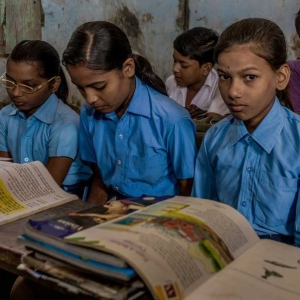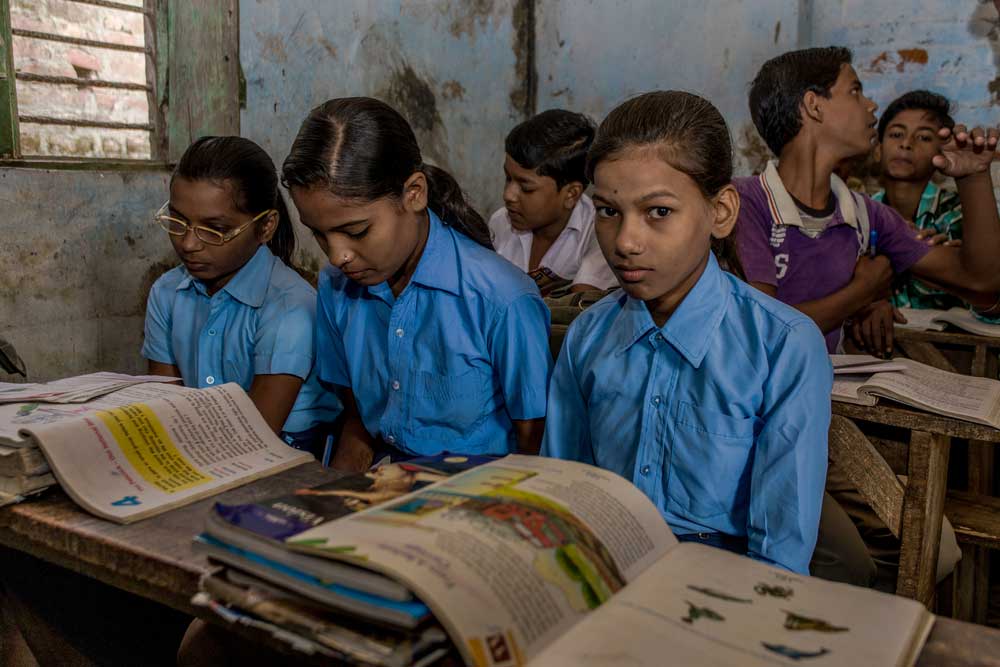
.png) Jaswant Kaur
Jaswant Kaur

In her shortest speech, Finance Minister Nirmala Sitharaman laid out the outline for the fiscal year 2024-25 during her presentation of the interim budget: "We need to focus on four major castes: 'Garib' (Poor), 'Mahilayen' (Women), 'Yuva' (Youth), and 'Annadata' (Farmer). Their needs, aspirations, and welfare are our highest priority. The country progresses when they progress. All four require and receive government support in their quest to better their lives."
The words would have sounded magical for people who form the "vote bank" of the ruling party. Moreover, the budget speech came across as a vision statement for the next 25 years, popularly called the Amrit Kaal, leading to a Viksit Bharat. More than the budgetary allocations, the finance minister praised the "profound positive transformation" that has happened during the last decade since the Narendra Modi Government came to power. "With the 'whole nation' approach of 'Sabka Prayas', the country overcame the challenge of a once-in-a-century pandemic, took long strides towards 'Atmanirbhar Bharat', committed to 'Panch Pran', and laid solid foundations for the 'Amrit Kaal'. As a result, our young country has high aspirations, pride in its present, and hope and confidence for a bright future. We expect that our government, based on its stupendous work, will be blessed again by the people with a resounding mandate," she said. If you think it was an election speech, you are highly mistaken!
The minister also laid down the core strategy of making India a developed nation by 2047 by empowering youth – the Amrit Peedi, in alignment with the "Panchamrit" Goals guided by the principles of "reform, perform, and transform." With all kinds of flowery words, the minister went on to praise the National Education Policy 2020, the PM Schools for Rising India (PMSHRI) for imparting quality education, the Skill India mission for up-skilling 1.4 crore youth, PM Mudra Yojana for sanctioning 43 crore loans, and so on. The list is indeed long. However, these figures present a hunky-dory picture of India. But the fact remains that our children still struggle to get quality education.
The recent Annual Status of Education Report (ASER) shows how 14 to 18-year-old adolescents in rural India still struggle to read basic textbooks and cannot perform basic calculations in day-to-day financial decisions. The digital world is preoccupying our youth. Yet, they rarely use technology to enhance their knowledge or read books. Will these children be able to contribute to the growth of our country? Or will they be able to complete higher education or learn any skill to support their family with a basic income? The answer is not in the affirmative. After reading the report, many state governments decided to take action to improve their educational standard. Some of them announced surprise checks and tests in the schools.
What would have been basic expectations from the budget in such a scenario? We will not be able to become a developed nation if we are not focusing on our children's fundamental rights, including schooling. The Department of School Education and Literacy has introduced NISHTHA (National Initiative for School Heads and Teachers' Holistic Advancement) for capacity building of the teachers to improve learning outcomes. Not only this, the department has also taken steps to strengthen vocational training programs in schools. Unfortunately, Samagra Shiksha Abhiyan, realigned for implementing the national educational policy 2020, received an allocation of Rs. 37,500 crores, barely 0.12 per cent higher than the previous year.
If one looks at the decade-long budgetary allocation for programs concerning the development of children, it has reduced from 4.52 per cent in 2014-15 to 2.3 per cent in 2024-25. Despite an increase of 8.73 per cent in crime against children, as per NCRB (National Crime Records Bureau) data, not much has been done to increase the budget for child protection. The budget does not mention the National Child Labour Project (NCLP) for rescuing and rehabilitating child labourers. It is a known fact that children are often forced to work to supplement the family income of those living in extreme poverty, putting them at a considerable risk of trafficking, jeopardising their well-being, subjecting them to extreme trauma, and taking away their chances of living a healthy and dignified life.
Several educational schemes for children belonging to minority communities have received a drastic cut. The 'Education Scheme for Madarsas and Minorities' was allocated only Rs. 2 crore against Rs. 10 Crore in 2023-24. Similarly, the 'Free Coaching and Allied Scheme' received only ₹10 Crore against Rs. 30 crore last year. The "Pre-matric Scholarship for Minorities' saw a massive reduction of almost 25 per cent.
In stark contrast, the allocation for post-matric scholarships for minorities was increased by 7.55 per cent. However, the question is, if a child from a marginalised community does not get enough support during primary and elementary education, how can one expect them to reach the post-matric level?
Some of the few schemes that saw a substantial increase in budgetary allocations are Eklavya Model Residential Schools (EMRS), PM SHRI, Saksham Anganwari and Poshan 2.0, SAMARTHYA, and the National Institute of Public Cooperation and Child Development. However, this is within the overall 2.30 per cent budget, which boils to 0.33 per cent of the GDP!
As far as women are concerned, the allocations for the schemes for women's safety have been increased from Rs. 321 crore to Rs. 955 crore. However, the allocations for the Protection and Empowerment for Women scheme have mostly remained the same with Rs 3,146 crore allocated to it. The finance minister's speech did mention the female workforce participation rate, Mudra loans for women, etc. However, the central focus has remained on promoting self-help groups (Lakhpati didis). What schemes are being planned to encourage female participation in the workforce is not clear. Naari Shakti may have been used as a word several times to gain attention, but nothing substantial is there in the interim budget.
While the budget will be presented in July this year, the interim budget reflects the government's intent. It does not make significant announcements/schemes/promises to achieve Viksit Bharat's vision in 2047. Unlike the interim budget of 2019-20, which saw the announcement of several schemes, it is devoid of new welfare schemes. In fact, the allocations for most of the welfare schemes, especially for children, are being reduced with every consecutive year.
The only promise made is that of a white paper focusing on the Modi government's achievements, something not many would be interested in. It is important to note that this or the upcoming generation will not become the 'Amrit Peedi' unless proper investments are made for their future. The dream of a developed India remains only on paper.
The writer, a company secretary, can be reached at Jassi.rai@gmail.com.